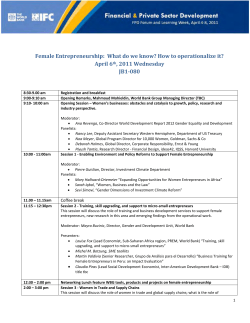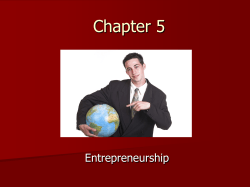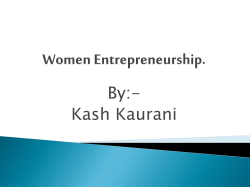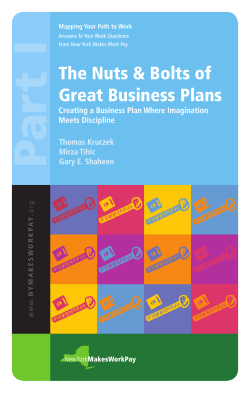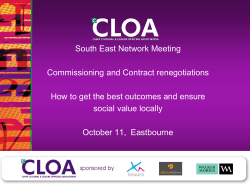
(SROI) methodology workshop
Social Entrepreneurship Program Terms of Reference Consultant Developing a Social Return on Investment (SROI) methodology Location : Cairo Application Deadline : 19/12/2014 Type of Contract : Service Contract Languages Required : English Duration of Contract : Two Months Background Information: Egypt is a country with millions of aspiring and active entrepreneurs. Entrepreneurial activity is taking place in all socio-economic strata of Egyptian society. People of all ages, educational backgrounds, household income levels, and urban-rural environments are actively engaged in some phase of entrepreneurial activity. However, there are many variances in entrepreneurial activity rates in different segments of society. In this regard, In full recognition of the critical role of entrepreneurs in job creation, innovation, growth, and national prosperity, the Government of Egypt is committed to creating an enabling environment for entrepreneurship to flourish in the country. The Government of Egypt have made much progress in recent years to improve the investment environment and to reduce the cost and complexity of registering new businesses. Our laudable performance on the World Bank Doing Business reports is indicative of the outcome of the government’s reform efforts. However, Egypt is still a developing economy and we know that much more needs to done to improve our competitiveness in the global marketplace. The Egyptian economy is expanding and we need to ensure that Egyptians have every opportunity to develop new business ideas, enter new markets, and produce new and innovative products and services to meet the needs of businesses and consumers in both local and foreign markets. Egypt cannot afford to build its future growth on foreign direct investment alone. We need to broaden our base of domestic investors and entrepreneurs to develop a more diversified and dynamic economy. Investing in this and the next generation of entrepreneurs, particularly social entrepreneurs. The Social Entrepreneurship Programme at Industrial Modernisation Centre objective is to Catalyzing the creation and nurture of micro-, small- and medium-sized businesses that aim for positive social or environmental outcomes while generating financial returns; through developing framework for action for social enterprises and social entrepreneurship. Social enterprises can help create jobs, devise innovative development solutions, and inspire young people to act as citizens who are both economically productive and socially engaged—all with the ultimate aim of promoting human dignity and greater social equity. Description of the Assignment: Social entrepreneurs are ‘searchers’ with a clear vision, a passion and a determination to create impact through social business. They combine risk taking with an innovative market-based business approach but one that is aimed at creating social change rather than serving the financial interests of shareholders only. Social entrepreneurs speak business but think social at the same time. Similarly social investors are driven by a strong vision to invest in businesses that create this so-called ‘blended value’: they produce not only economic value-addition and financial profits, but equally so social change and environmental benefit. Social investors accept that their capital may yield lower and slower financial returns on investment but they do accept and value other returns as well, notably in terms of social change. In other words, capital investment in a social business is (at least partly) provided by a social investor, who is satisfied with a lower dividend and a longer repayment period, but who instead receives a verifiable social and/or environmental return. Social Return on Investment (SROI) is an impact assessment approach that incorporates social, environmental, financial and economic values in management of and decision making on (social) business investments. The method assigns monetary values to results, also to the non-tangible non-financial results. By monetising these factors, blended values that are created through an investment can be captured and expressed in a numeric equivalent (known as an SROI ratio) to the ‘common’ financial return on investment. Objective of the Assignment: This workshop will be designed for Social Enterprises , Investors, organisations interested in measuring, analysing and learning from the social, environmental and economic effects brought about by the activities implemented, facilitated or (financially) realised by them and their project partners. It is targeted at parties who are already implementing SROI as well as those who have recently become interested in this methodology. This workshop must focus particularly on SROI applied in the development cooperation sector. This workshop also should focus on identify the benefits of SROI analyses such as : Improved Communication Providing credible numbers as well as qualitative and narrative value information – and a systematic story to support all of these – enables organisation to ‘talk’ to stakeholders with different preferences. Better Focus on what’s Important By focusing on the critical impacts, an SROI analysis can be completed relatively quickly. It is an effective way of defining the management information systems necessary to make it quick in the future. Clarity in Governance If accountable organizations are more sustainable, then understanding and explaining these impacts, and then responding to them, is critical. SROI analysis can help clarify impacts and focus the response. Responding to stakeholders enables them to influence the organization. As a result, the organization’s governance will be more closely related to the stakeholders’ requirements. Growing or Changed Investment Mentality The concept of social return helps one to understand that any grant or loan can be thought of as an investment, rather than as a subsidy. The focus shifts to the creation of value, and away from the risk mentality and opportunity cost of using money here rather than there. The workshop must provide step-by-step support to apply SROI to their planning, monitoring and evaluation practices and to embed SROI within their organisations. Requested Services: The following is the detailed activities to be delivered & reported during the Workshop but not limited to the following: Uses of SROI (valuation and monitoring) SROI analysis : SROI analysis consists of several steps, which are reflected in the SROI tool: 1. Project/Business Description 2. Describing a Theory of Change 3. Recognizing Stakeholders 4. Determining Input 5. Determining Activities 6. Determining Output 7. Determining Outcome, Impact & Attribution ( must shows the Calculation of the SROI ratio) 8. Determining Indicators 9. Using Monetization 10. Making Projections Integrating SROI in the organisation Ensuring necessary capacities and conditions Capacity for people and their organisation Incentives Operational structure and SROI responsibilities Information system Finances and resources Links with other Methodologies Determining the fit within PM&E practices Study cases Preparing the SROI exercise & SROI report Assignment Duration: The workshop duration from 2-3 Days according to the workshop activities. Assignment Location: Assignment will be located in Cairo Accommodation, transportation and any other support facilities required for the assignment are the responsibility of the Contractor. Assignment Requirements: Proposal should include the following requirements: Workshop syllabus Workshop action plan and activities Budget Consultant profile & experience : Experience in international development. Demonstrated background in economics and project management. Advanced level expertise in application of socio-economic cost benefit. analysis methodologies (experience in applying Social Return on Investment methodology is highly desirable). Ability to analyse large amounts of information and undertake critical and relevant written analysis. Working Days: The consultant is expected to work 5 working days Interested parties should send their Technical and financial offer to the below email: nmahgoub@ecrc.org.eg
© Copyright 2025




